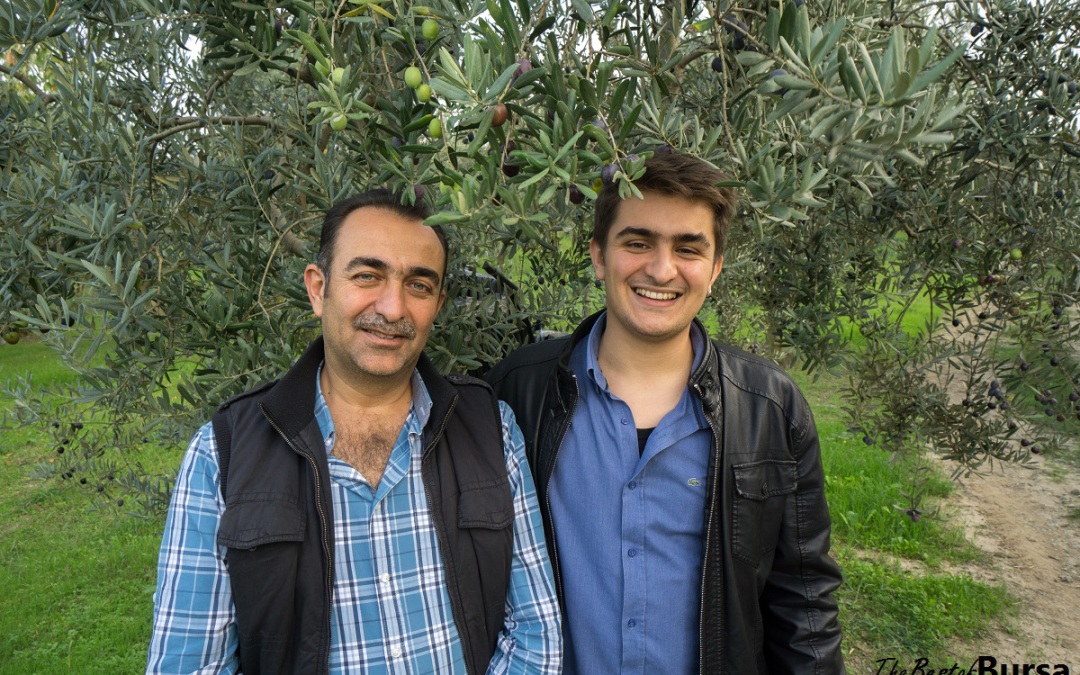“You can taste it if you want, but I don’t recommend it,” my friend Arif warned me in Turkish as we walked through one of his olive groves. Or at least that’s what I thought he said. I had just pulled a green olive off one of his trees and was closely examining it, wondering what a freshly picked olive tastes like. Since coming to Bursa, we have come to absolutely love fresh olives in all colors, and we buy nearly all of our olives and olive oil from Arif. Sometimes when we walk past Arif’s shop, my children beg me to stop in and buy a half-kilo or so of his tasty, salty green olives. So, I thought, how bad can an olive really taste right off the tree? My curiosity got the best of me. As I put it to my lips and bit in, an overpowering, lurid bitterness instantly filled my mouth. I immediately spit it away and tried my best to keep a straight face in front of Arif. Some kind of magic, I figured, must happen from the time the olives are picked off the tree to the time they are sold in Arif’s shop.
It was a crisp, delightful October late afternoon as we strolled through his orchard on a hilltop just outside the village of Umurbey. Arif and his son, Mehmet, had invited my family to come to their olive farm months before, and finally it had worked out for us to make a visit. As we walked along the dirt path running through the orchard, our kids dashed and skipped from one tree to the next, stopping to look for sweet treasures under the handful of fig trees scattered among the otherwise pale-leafed monoculture.

As we slowly wandered to the far end of the grove, the trees gave way to a stunning vista overlooking the city of Gemlik on the coast of the Marmara Sea. Olive tree-blanketed hills gently rolled down to the shore, while boats moored in the harbor glimmered in the lowering sun. Gemlik is nationally and even internationally famous for its olives. The soil, topography, and climate are ideal for olive production, and some of the world’s largest olive companies have a presence in Gemlik. One popular olive variety cultivated throughout Turkey even bears the city’s name.
A small, fourth-generation, family-run operation, Arif’s is the only certified organic olive farm in the Gemlik region. This is something he is very proud of. “Other farmers around here say they are organic, but we are the only farm with a certificate,” Arif explained. “Everything we do here is natural. No pesticides, no chemicals. We are very serious about taking care of our land and our trees.” So serious, in fact, that in the age of mechanized conveniences, they’ve stuck to the old-fashioned way of harvesting: picking each olive by hand, one-by-one. “I don’t like how the harvesting machine shakes my trees. Olive trees are sensitive plants.”
Spread over four groves, Arif’s farm consists of some 2,500 trees on around 60 hectares of gently rolling hills. “We harvest 40-50 (metric) tons of olives in a decent year,” he explained. “Of that, we usually press seven or eight tons into oil and cure the rest for table eating.” This fall, though, the harvest hasn’t been nearly that good. Heavy spring rains at just the wrong time knocked many blossoms off the trees. “We’ll be lucky to bring in 10 tons this year,” Arif predicted. “It’s the worst year I’ve ever seen, and it’s that way for everybody around here.”
But this year’s paltry harvest doesn’t seem to bother him too much. “We’ll have plenty to sell in our shop, and for me, that’s enough,” Arif suggested with a sense of optimism. Many Gemlik producers sell to large processors at wholesale prices, but with his steady stream of faithful customers, Arif is able to exclusively sell his olives in his own shop at market value.
“My customers seem to really be wanting green olives these days, so we’ll be harvesting early this year before most of them turn red and black,” Arif said. Little did I know that green, red, and black olives all come from the same tree—I had assumed they were actually different varieties. The color differences, as I came to learn, are in the maturity of the fruit: green olives are immature, black olives are ripe, and red olives are somewhere in between. After harvesting, the olives destined for the table are cured in salt brine, some for up to a year, while the rest are pressed for their oil.
That evening after touring the olive farm, my family and I sat around Arif’s dining table while his lovely wife, Kevser, showed us the kind of hospitality for which Turkey is famous. Over a plate of beefsteak, fried potatoes, stuffed peppers, rolled grape leaves, stuffed pumpkin flowers, eggplant casserole, and, of course, green and black olives, we heard stories of their love for olive farming, their love for the quiet village life, and their love for each other.











. . like you, we prefer to buy our olives from the farmers - small producers of untainted, organic stuff - we even buy our big, healthy roosters, ready for the pot with an hour’s notice, from a guy on the edge of the village.
Glad to hear it, Alan. Family-run operations are certainly the best-good people and good products.